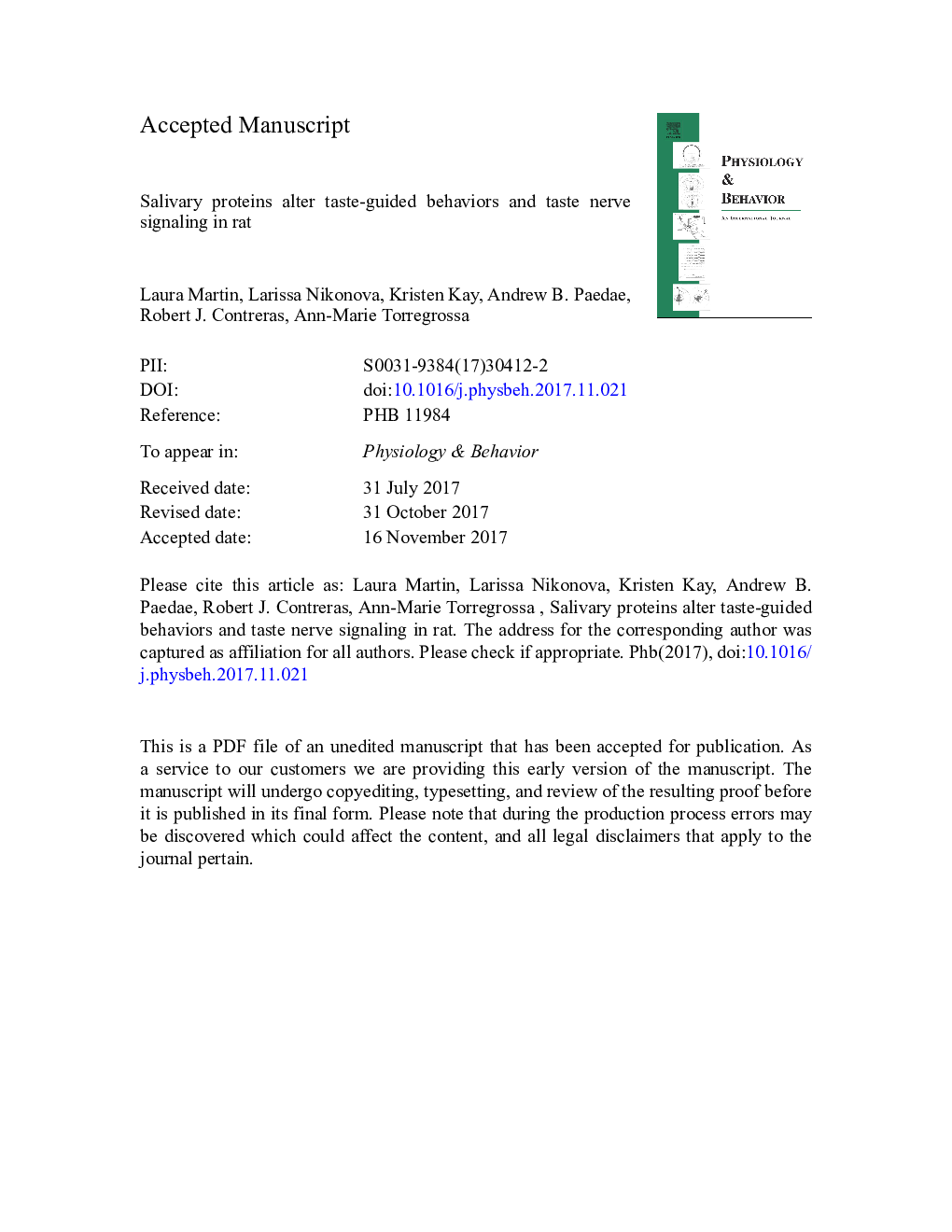| کد مقاله | کد نشریه | سال انتشار | مقاله انگلیسی | نسخه تمام متن |
|---|---|---|---|---|
| 8650705 | 1571135 | 2018 | 47 صفحه PDF | دانلود رایگان |
عنوان انگلیسی مقاله ISI
Salivary proteins alter taste-guided behaviors and taste nerve signaling in rat
ترجمه فارسی عنوان
پروتئین های بزاق تغییر رفتار طعم گوشتی و سیگنالینگ عصب طعم در موش صحرایی است
دانلود مقاله + سفارش ترجمه
دانلود مقاله ISI انگلیسی
رایگان برای ایرانیان
کلمات کلیدی
بزاق، طعم تلخ،
موضوعات مرتبط
علوم زیستی و بیوفناوری
بیوشیمی، ژنتیک و زیست شناسی مولکولی
فیزیولوژی
چکیده انگلیسی
Taste stimuli are normally dissolved in saliva prior to interacting with their respective receptor targets. There are hundreds of proteins in saliva, and it has been hypothesized that these proteins could interact with either taste stimuli or taste receptors to alter taste signaling and diet acceptance. However, the impact of these proteins on feeding has been relatively unexplored using rodent models. We have developed a novel technique for saliva collection that allows us to link salivary protein expression with feeding behavior. First, we monitored the microstructure of rats' feeding patterns on a 0.375% quinine diet (Q-diet) while tracking changes in salivary protein expression. We found 5 protein bands were upregulated by diet exposure to Q-diet and upregulation of a subset of these bands were statistically related to increased diet acceptance, including changes in behavioral measures that are thought to represent both orosensory and postingestive signaling. In a second experiment, we measured the licking to a range of quinine solutions (0.01-1.0Â mM) before and after the animals were exposed to a tannic acid diet that altered salivary protein expression. Rats found the quinine solutions less aversive after salivary protein altering diets. In a third experiment we recorded the response of the chorda tympani (CT) nerve while delivering quinine solutions (0.3-30Â mM) to the front of the tongue dissolved in either “donor saliva” containing salivary proteins or donor saliva which has had the salivary proteins removed. Donor saliva was collected from a separate group of animals using isoproterenol and pilocarpine. The samples containing salivary proteins resulted in lower nerve responses than those without salivary proteins. Together these data suggest that salivary proteins are capable of altering taste-guided behaviors and taste nerve signaling.
ناشر
Database: Elsevier - ScienceDirect (ساینس دایرکت)
Journal: Physiology & Behavior - Volume 184, 1 February 2018, Pages 150-161
Journal: Physiology & Behavior - Volume 184, 1 February 2018, Pages 150-161
نویسندگان
Laura E. Martin, Larissa V. Nikonova, Kristen Kay, Andrew B. Paedae, Robert J. Contreras, Ann-Marie Torregrossa,
